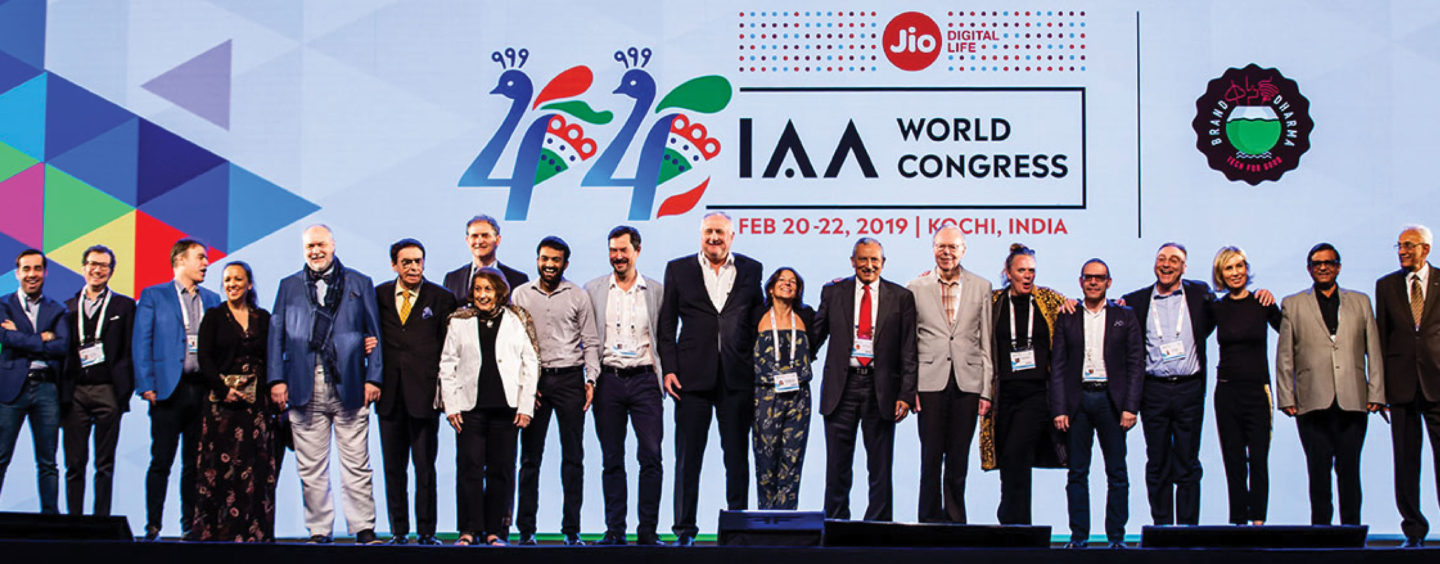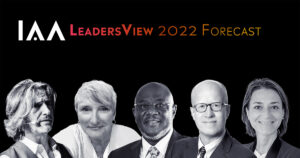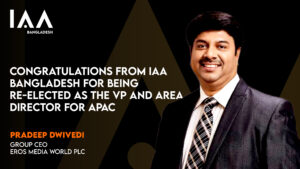The International Advertising Association (IAA) has held its 44th World Congress in Kochi, India. It was the first ever iteration of the congress in India.
The International Advertising Association (IAA) is a unique strategic institution that addresses common interests of every discipline across the entire spectrum of marketing communications; these include advertisers, media companies, advertising and interactive agencies, direct marketing firms, as well as individual practitioners. Started in New York in April 1938, IAA is the only global organization today representing the interest of the entire marketing and communications industry with well-established presence in over 50 countries.
Held at Lulu Bolgatty International Convention Centre (LBICC), Kochi from February 20 to 22, the congress successfully brought together some of the best minds of the world. The event saw a mix of thought leaders, spiritual gurus, entertainers, industry professionals and policy makers as well.
The 3-day eccentric event had more than 2000 delegates from around the world, more than 40 speakers, 7 Fortune 500 Company heads, 11 tech giants, 10 Marketing Stalwarts, 3 Bollywood Stars and 1 humanoid Robot. The 44th World Congress was indeed a successful collective event from the International Advertising Association. Moreover, 14 Bangladeshi delegates including business leaders and eminent marketing & advertising professionals attended the program. Taking notes from the congress, they will focus on building a better community for the IAA Bangladesh Chapter and will share their insights in future engagements.
Coming back to the 44th World Congress, the speaker list the event included big names such as Mukesh Ambani, Chairman and Managing Director, Reliance Industries Ltd; Paul Polman, Chief Executive Officer, Unilever; Steven Mollenkopf, CEO, Qualcomm; Nandan Nilekani, Non-Executive Chairman of Infosys; Rajeev Misra, CEO, SoftBank Investment Advisers UK – just to name a few. Moreover, Indian spiritual leader Sri Sri Ravi Shankar and Bollywood celebrities Amitabh Bachchan and Deepika Padukone also participated in the congress. Some of the other speakers included tennis greats Andre Agassi & Vijay Amritraj; Chris Tung, Chief Marketing Officer, Alibaba Group; Carolyn Everson, Facebook’s Vice President of global marketing solutions, and Simon Kahn, Chief Marketing Officer of Google APAC.
The theme of the 44th edition of the IAA World Congress – ‘Brand Dharma, What’s coming next?’ aimed at focusing on the basic principles that a brand has to follow while connecting with its consumers.
Addressing the congress, IAA Chairman & World President Srinivasan K Swamy said, “Today’s brand has to stand for what is righteous. Dharma is an Indian/Sanskrit word that stands for doing one’s duty, do what is right for consumers, society at large and must stand for a cause. It is a whole new world today where products and services will have to not only satisfy consumers on quality and delivery, but they should stand for a higher purpose.”
For the theme of the congress, ‘Dharma’ can be further described as Righteousness, Duty, Responsibility, Virtue, and Goodness. Moreover, Brands are no longer just mere products or services – anything can be established as a brand – a person, a place, even a particular smell. Today’s customers are looking for far more than mere product attributes. They want to know whether the manufacturer ensured equal opportunities while employing. They are curious about the source of the raw material; they want to know if the finished goods were manufactured in decent environments. So, the brands must redesign their ‘Dharma’ in order to cope with these evolving mindset of customers. Hence, the congress focused on delving into what’s coming next in that all-important space.
Discussing the theme ‘Brand Dharma, What’s coming next?’, speakers punctuated the changes that will make a difference in the industry. The global speakers emphasized on the direction in which things are moving. They also predicted that the disruptive technologies will change the way of how business is done and how things will happen in the next 10 years from now if the direction is right.
The congress also focused on in-depth insights into topics like Artificial Intelligence (AI), Internet of Things (IoT), Machine Learning (ML), Data Science/Mining and Analytics. The congress also addressed the advent of Over-the-Top (OTT) platform that has become a rage with the millennial populations. Topics like online/digital marketing and its evolution, changing consumer behavior and its impact on various businesses have been delved into by respective subject specialists as well.
KEY EXCERPTS FROM THE SESSIONS
DAY 1
Big Brand Gyan – Amitabh Bachchan
Amitabh Bachchan, the biggest name in India and icon of statesmanship, opined that it’s competition, and not monopoly or regulation that helps brands tackle challenges and decide market economics. “Competition makes brands invest in research, continual improvement of quality, staff productivity and customer satisfaction,” he said, addressing the gathering of advertising stalwarts, novices and students at the inaugural ceremony of the advertising convergence in Grand Hyatt Bolgatty.
The face and voice of nearly 24 Indian brands, Bachchan, however, said that he was no master of the craft of selling and branding, but admitted that he too believed in Dharma. “I do not advertise alcohol or tobacco; that’s my Dharma. Although my presence can’t prevent the existence of such products, those brands advertise the ill-effects of substance abuse; that, is their dharma,” he stressed.
Batting for indigenous branding and market, in an apparent reference to Make in India, the Bollywood actor also called for cooperation among brands moderated by a code of ethics that delivers what it promises.
A branding, Bachchan added, is an investment of self-respect, sustainable development and globalization. “It represents vision, mission, objectivity and performance,” he told a cheering crowd, who hailed his thoughtful session on ethical branding.
Spiritual Insights on Dharma – Sri Sri Ravi Shankar
As the ambassador of peace, Sri Sri Ravishankar in his soothing voice, guided the audience to meditate for a few minutes, they swiftly sat back on their chairs, closed their eyes and let out a relaxed sigh. For a crowd that was waiting for a day packed with informative and educational sessions on various aspects of advertising and marketing, this was an unexpected but welcome break.
The relaxed audience were then ready to hear him shed light on what he feels about Brand Dharma. “Advertising is all about communication – how you communicate and what needs to be communicated.” He then went onto cite an example of how, when he visited his friend’s restaurant, was served food made at home instead of what was prepared in the restaurant. “I insisted that I wanted to have the food prepared at the restaurant, but he did not wish to serve me that. If you do not believe your own product or brand, then it is not Dharma,” he said.
Ravi Shankar also spoke about how technology today is affecting children. “Today, there is too much use of social media and this is affecting the very personality of youngsters and kids. I think that Brand Dharma will help here in guiding people to lead a healthy and happy life,” he concluded.
With Great Data Comes Great Responsibility – Hans-Paul Bürkner
Whenever the question of ethics is raised, along pops up the intriguing part – privacy of data. It was Hans-Paul Bürkner, Chairman of Boston Consulting Group, who took up the task to enlighten the crowd about the much-asked query ‘Who really owns the data?’ at the 44th IAA World Congress.
He underscored how personalization is possible and doable and is an absolute must for most companies as new consumers are really expecting personalisation of information and now companies have the tech to make it work. He indicated the fact that in today’s society, privacy is dead, but security is a big issue and both of them are interlinked as there is need of respecting privacy and security needs of the customers.
Era of Innovation Ahead – Penny Baldwin
Penny Baldwin, Senior VP and CMO, Qualcomm Technologies, delivered a profound talk on ‘Accelerating mobile revolution’ at the IAA World Congress. She spoke about how mobile is the world’s largest tech platform in the history of mankind and how Brand Dharma of Qualcomm is innovation. According to Baldwin, mobile is the largest technology platform. With the advent of 5G, browsing will turn 10 times faster and data traffic will see a cent per cent hike. “More than 20 network operators and device manufacturers have announced rolling out 5G technology. Soon, it will impact all sectors. By 2035, agriculture sector will receive real-time intelligence for crops – to detect pests, weather forecast, etc. By bringing virtual to life, 5G will turn the ordinary to extraordinary,” Penny concluded.
No Room for Secrets in Digital World – Dr. Shivakumar
One of the most enlightening sessions of Day 1 of IAA meet was helmed by D. Shivakumar, Group Executive President – Strategy & Business Development, Aditya Birla Group. His session on ‘Brands Trust in Digital World’ shed light on the various ways through which consumers and digital media work, especially when it comes to trusting a brand.
He introduced the audiences to the DUCA (Digitally Unacceptable Content and Attitude) world. He mentioned that digital has become mainstream today. Consumers of this digital world are more aware, more cynical and more distrusting. He added, “People trust people like them. In a digital world, it is society, not your stakeholder and not your board that matter. If you need to build trust, you need to build that trust in society.”
Customer Acquisition, Customer Delight and Zero Cost Innovation – Jonas Kjellberg
Jonas Kjellberg, Lecturer, Author, Venture Investor and Co-Creator of Skype, talked on “Three key gears for building game changing companies and deploying capital”. He shed lights on customer acquisition, customer delight and zero cost innovation. Jonas said, “What a customer loved before, today it has become a commodity, so there is need to spend time and energy on tomorrow’s delight through innovation and not only about today’s efficiency and functionality. Innovation in business model should be zero/no-cost innovation like Airbnb, Uber and Alibaba, as these businesses gained from innovating and not imitating.”
DAY 2
It’s Time to Unite and Act – Marc S. Pritchard
“We are clearly on the edge to use technology to make lives better. So, come together to use technology for good”, said Marc S. Pritchard, Chief Branding Officer of Procter & Gamble while stressing on technology for good. While delivering an insightful talk on “Leading Disruption to Drive Growth”, Marc highlighted the significance of collaboration by brands for improvement of society through novel, inspiring initiatives. Addressing the gathering at the second day of the congress, he suggested, “Focus on technology should go beyond advertisements. We need to focus energy saving, gender equality and unstereotyping alliances.”
He gave several examples of promoting sustainable behavior in order to protect the environment. Taking the examples of Tide campaign and P&G hashtag campaign, he stressed on the facts how the last decade witnessed the disruption of technology in the advertisement industry. Marketing has enhanced experiences of the consumers greatly. Playing a video of the next-gen AI toothbrush, he concluded that people are clearly on the edge to use technology for making lives better. So, people should come together to use technology for good.
Csr Is Not Good Enough Anymore – Paul Polman
Paul Polman, President of the ICC, Chairman of the B-Team and Vice-Chair of the UN Global Compact conducted a thought provoking session on “Shaping Society Through Purposeful Business”. With his years of knowledge, he conducted the session focusing on how the industry functions and had some insightful pointers that indicated the advertisers’ responsibilities towards the future generation.
“Value and trust in today’s environment is probably more valuable than ever before. Trust is low in the industry, because of fake news, fraud, employment practices, sexual harassment and so on.”
He asked the companies about their decisions on various social issues by summing up, “Businesses can’t succeed in a society that is failing. Running business on CSR is not good enough anymore. Some of the challenges before them include Decarbonising, setting up of long term business models, moving towards a circular economy and to make sure to have an inclusive economy.”
Blur The Line Between Online, Offline – Simon Kahn
Simon Kahn, Chief Marketing Officer at Google APAC, offered a glimpse to the upcoming intuitive technology while delivering a talk on “The Future of Digital Immersion”. Having led the innovation hub by overseeing Google’s strategy, research, brand management, advertising, consumer products and business solutions across 16 countries, Simon observed a massive evolvement in the technology. “With the shift from keyboard to mouse to palmtops touch screen, interface will become more and devices, more intuitive. The key steps will be Assist, Augment and Accelerate”, he said.
Explaining how Assist makes entertainment faster than before, he presented an insight regarding the 70 percent accuracy in 2013, that has jumped to 95 percent in a matter of just four years. “As it understands the cultural references and nuances, local language and slangs earn more acceptability in the tech world”, he said.
On the other hand, Augment blends both online and offline experience and Accelerate releases the tensorflow, that is an open-source software library for dataflow and differentiable programming across a range of tasks.
The Alibaba Kind of Success – Chris Tung
Chris Tung, CMO, Alibaba gave insight into the unique business model of Alibaba with the topic “A unique Alibaba model for brand growth”. He shed light on the methodology through which Alibaba helped achieve growth in all their brands in the past two years. Speaking on what Alibaba does as a platform, he said, “Many of you have an impression that Alibaba is an e-commerce company. Yes, that is how we started out, but today Alibaba as a company pretty much does everything in China.” He cites an example that Alibaba can be seen as an entity looking like a combination of Amazon, Facebook and Google. While talking about the infrastructure for brand building in Alibaba, he explained, “This is no longer about selling the product of your flagship store on Alibaba platform, this is about how do we translate the data with AI to marketable insight for brand owners and also to form a close loop of ecosystem for marketers to keep optimizing their marketing effort and get feedback through the data and analyse the data for another round to optimize their marketing effort.” He concluded his session by stating that this is the best time for creative directors in advertising agencies as there’s huge demand for creating more stories in the digital world today.
Importance of Emotional Sustainability – Piyush Pandey
Speaking on the session “Brand Communication for a Social Change”, Piyush Pandey, Global Chief Creative Officer of Ogilvy & Mather, stressed on the significance of emotional stability. Piyush spoke about the raw emotion that binds human together. He shared some of his personal experiences that strengthened his views on the need to adhere to the idea behind sustainability of human relationships. Moreover, he showed some of his TV commercials where brands placed the value of relations as the core of its message. “Human relations are not being expressed where it should be and personal interface can never be a match for ‘Facetime’, I am sorry, it simply cannot be. If big brands can give messages which are beneficial to the brands and to the society at the same time, there is a lot of magic there,” he summed up.
Honoring Brand Masters
The second day of the IAA World Congress had some outstanding performers in the field of Marketing communications. The Congress witnessed these performers being awarded IAA Golden compass and Inspire awards. In order to recognize and honor men and women for their outstanding contribution in the field of advertising and marketing, the awards were established.
The IAA Golden Compass Award for Marketing and Communication 2019 was awarded to Mark Pitcher, Chief Brand Officer of P&G, for his ‘ethos and his ability to build lives, not just sell’. Andrew Robertson, President and CEO of BBDO World, was awarded the IAA Golden Compass honors award. Moreover, Raj Nayak, CEO of Colours, took home the IAA inspire Champion award for his contribution to IAA and Ranil De Silva, former Managing Director of Leo Burnett was awarded the Honorary Life Member award.
DAY 3
More Choices Lead to Better Opportunity – Sheena Iyenger
Speaking on the topic “The Art of Making Choices”, Sheena Iyenger, Professor, Columbia Business School shared, “No matter where you go in the globe, we have choices we make now that we never imagined we would make. More choice means better opportunity to choose what we want, but it also makes harder for us to choose.”
Changing Tech, Stable Information – Pranav Mistry
During the session on “The Future of Mobiles and Wearable Technology”, Pranav Mistry, Head, Think Tank Team & Global Vice President-Research of Samsung, spoke on Tablets that are becoming a concept going on since years and can be dated as ancient as 5500 BCE. It is the same now; just the tech and mediums are changing. Today’s tech is more interactive unlike TV and radio. Information part is the only thing that stays stable. However, tech and medium keep changing and will keep changing.
Blue Ocean Strategy Leads to Innovation – Jean David
While talking on “Cirque du Soleil – Lessons in Innovation”, Jean David, Pioneer and Builder, Cirque du Soleil started his discussion by pointing out how Cirque du Soleil is a great example of blue ocean strategy. Speaking on how his company became a game changer, he pointed out, “We believed that our clients are intelligent people and we stressed that in our marketing and communication. We realized that we needed to be respectful of our clients and transparent, because they were looking for authenticity, meaning in what they experience and willing to share what they experienced; our clients, integrate experience in their own identity.”
Humanity & Artificial Intelligence – Rumman Chowdhury
During the session on “Responsible Artificial Intelligence for Humanity”, Rumman Chowdhury, Global Lead for Responsible AI, Accenture Applied Intelligence shared, “AI is something you use every single day on screens.” He stressed on the fact that data is not an objective truth; rather it is the reflection of pre-existing institutional, cultural and social biases.
The 44th iteration of IAA World Congress in Kochi has truly been a premier event that served global perspectives. The three days of exchange of ideas and motivations of the star speakers from all around the world have been helpful in terms of accessing an international network first-hand and obtaining absolute connections worldwide.
Photos used in this article have been taken from the website of IAA India Chapter, retracted from www.iaaindiachapter.org







